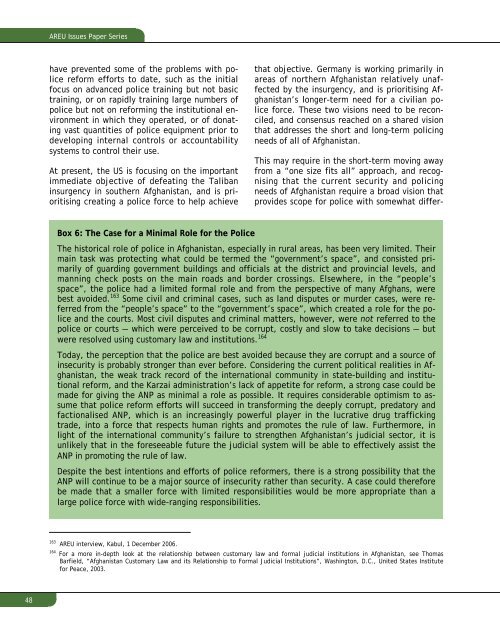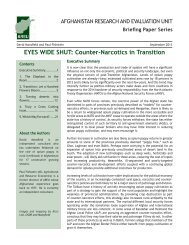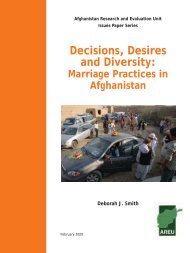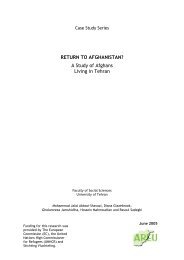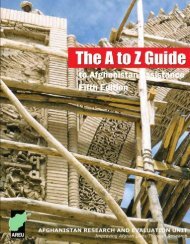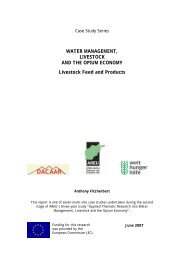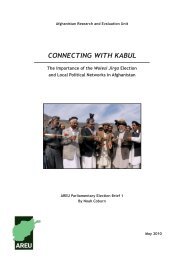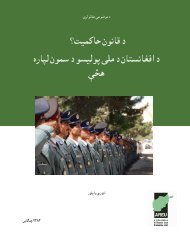Cops or Robbers? The Struggle to Reform the Afghan National Police
Cops or Robbers? The Struggle to Reform the Afghan National Police
Cops or Robbers? The Struggle to Reform the Afghan National Police
You also want an ePaper? Increase the reach of your titles
YUMPU automatically turns print PDFs into web optimized ePapers that Google loves.
AREU Issues Paper Series<br />
have prevented some of <strong>the</strong> problems with police<br />
ref<strong>or</strong>m eff<strong>or</strong>ts <strong>to</strong> date, such as <strong>the</strong> initial<br />
focus on advanced police training but not basic<br />
training, <strong>or</strong> on rapidly training large numbers of<br />
police but not on ref<strong>or</strong>ming <strong>the</strong> institutional environment<br />
in which <strong>the</strong>y operated, <strong>or</strong> of donating<br />
vast quantities of police equipment pri<strong>or</strong> <strong>to</strong><br />
developing internal controls <strong>or</strong> accountability<br />
systems <strong>to</strong> control <strong>the</strong>ir use.<br />
At present, <strong>the</strong> US is focusing on <strong>the</strong> imp<strong>or</strong>tant<br />
immediate objective of defeating <strong>the</strong> Taliban<br />
insurgency in sou<strong>the</strong>rn <strong>Afghan</strong>istan, and is pri<strong>or</strong>itising<br />
creating a police f<strong>or</strong>ce <strong>to</strong> help achieve<br />
that objective. Germany is w<strong>or</strong>king primarily in<br />
areas of n<strong>or</strong><strong>the</strong>rn <strong>Afghan</strong>istan relatively unaffected<br />
by <strong>the</strong> insurgency, and is pri<strong>or</strong>itising <strong>Afghan</strong>istan’s<br />
longer-term need f<strong>or</strong> a civilian police<br />
f<strong>or</strong>ce. <strong>The</strong>se two visions need <strong>to</strong> be reconciled,<br />
and consensus reached on a shared vision<br />
that addresses <strong>the</strong> sh<strong>or</strong>t and long-term policing<br />
needs of all of <strong>Afghan</strong>istan.<br />
This may require in <strong>the</strong> sh<strong>or</strong>t-term moving away<br />
from a “one size fits all” approach, and recognising<br />
that <strong>the</strong> current security and policing<br />
needs of <strong>Afghan</strong>istan require a broad vision that<br />
provides scope f<strong>or</strong> police with somewhat differ-<br />
Box 6: <strong>The</strong> Case f<strong>or</strong> a Minimal Role f<strong>or</strong> <strong>the</strong> <strong>Police</strong><br />
<strong>The</strong> hist<strong>or</strong>ical role of police in <strong>Afghan</strong>istan, especially in rural areas, has been very limited. <strong>The</strong>ir<br />
main task was protecting what could be termed <strong>the</strong> “government’s space”, and consisted primarily<br />
of guarding government buildings and officials at <strong>the</strong> district and provincial levels, and<br />
manning check posts on <strong>the</strong> main roads and b<strong>or</strong>der crossings. Elsewhere, in <strong>the</strong> “people’s<br />
space”, <strong>the</strong> police had a limited f<strong>or</strong>mal role and from <strong>the</strong> perspective of many <strong>Afghan</strong>s, were<br />
best avoided. 163 Some civil and criminal cases, such as land disputes <strong>or</strong> murder cases, were referred<br />
from <strong>the</strong> “people’s space” <strong>to</strong> <strong>the</strong> “government’s space”, which created a role f<strong>or</strong> <strong>the</strong> police<br />
and <strong>the</strong> courts. Most civil disputes and criminal matters, however, were not referred <strong>to</strong> <strong>the</strong><br />
police <strong>or</strong> courts — which were perceived <strong>to</strong> be c<strong>or</strong>rupt, costly and slow <strong>to</strong> take decisions — but<br />
were resolved using cus<strong>to</strong>mary law and institutions. 164<br />
Today, <strong>the</strong> perception that <strong>the</strong> police are best avoided because <strong>the</strong>y are c<strong>or</strong>rupt and a source of<br />
insecurity is probably stronger than ever bef<strong>or</strong>e. Considering <strong>the</strong> current political realities in <strong>Afghan</strong>istan,<br />
<strong>the</strong> weak track rec<strong>or</strong>d of <strong>the</strong> international community in state-building and institutional<br />
ref<strong>or</strong>m, and <strong>the</strong> Karzai administration’s lack of appetite f<strong>or</strong> ref<strong>or</strong>m, a strong case could be<br />
made f<strong>or</strong> giving <strong>the</strong> ANP as minimal a role as possible. It requires considerable optimism <strong>to</strong> assume<br />
that police ref<strong>or</strong>m eff<strong>or</strong>ts will succeed in transf<strong>or</strong>ming <strong>the</strong> deeply c<strong>or</strong>rupt, predat<strong>or</strong>y and<br />
factionalised ANP, which is an increasingly powerful player in <strong>the</strong> lucrative drug trafficking<br />
trade, in<strong>to</strong> a f<strong>or</strong>ce that respects human rights and promotes <strong>the</strong> rule of law. Fur<strong>the</strong>rm<strong>or</strong>e, in<br />
light of <strong>the</strong> international community’s failure <strong>to</strong> streng<strong>the</strong>n <strong>Afghan</strong>istan’s judicial sect<strong>or</strong>, it is<br />
unlikely that in <strong>the</strong> f<strong>or</strong>eseeable future <strong>the</strong> judicial system will be able <strong>to</strong> effectively assist <strong>the</strong><br />
ANP in promoting <strong>the</strong> rule of law.<br />
Despite <strong>the</strong> best intentions and eff<strong>or</strong>ts of police ref<strong>or</strong>mers, <strong>the</strong>re is a strong possibility that <strong>the</strong><br />
ANP will continue <strong>to</strong> be a maj<strong>or</strong> source of insecurity ra<strong>the</strong>r than security. A case could <strong>the</strong>ref<strong>or</strong>e<br />
be made that a smaller f<strong>or</strong>ce with limited responsibilities would be m<strong>or</strong>e appropriate than a<br />
large police f<strong>or</strong>ce with wide-ranging responsibilities.<br />
163 AREU interview, Kabul, 1 December 2006.<br />
164 F<strong>or</strong> a m<strong>or</strong>e in-depth look at <strong>the</strong> relationship between cus<strong>to</strong>mary law and f<strong>or</strong>mal judicial institutions in <strong>Afghan</strong>istan, see Thomas<br />
Barfield, “<strong>Afghan</strong>istan Cus<strong>to</strong>mary Law and its Relationship <strong>to</strong> F<strong>or</strong>mal Judicial Institutions”, Washing<strong>to</strong>n, D.C., United States Institute<br />
f<strong>or</strong> Peace, 2003.<br />
48


